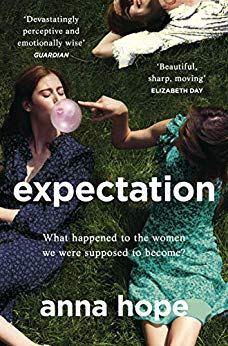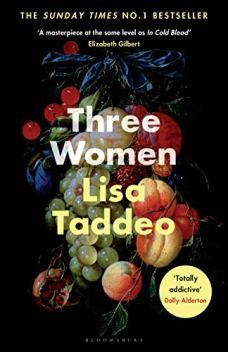One of the scariest things about writing is realising that you have no say over how anyone interprets or receives your work – the reader encounters any narrative through the prism of their own knowledge, beliefs and life experience. Nothing has brought this home to me more than readers seeing all kinds of interesting things in my first novel that I didn’t knowingly put there (the moment I should really shut up and say thank you.) On the other hand, knowing people are free to think what they like is liberating; readers are going to have their own opinions no matter what. You do, I do. We’re not necessarily going to like, agree or identify with the characters, underlying ideas or each others’ views. That’s good, isn’t it?
Today I’m taking a look at two books about three women which illustrate this kind of mixed response from me as a reader. Expectation by Anna Hope and Three Women by Lisa Taddeo were both published last year (soon out in paperback) and achieved a level of success and attention (some might say ‘hype’) which sets the bar high. They’re two of the most stimulating books I’ve read recently, precisely because they riled me at times. In a good way, in as far as they engaged my brain and made me burn to discuss them with other people, which I have, and to recommend them, which I am.

I empathised with each of them to a degree but the way they behaved towards each other got in the way of deep emotional engagement. Of course conflict is what drives a story but female friendship has such an important, sustaining role in women’s lives that it saddened me to see so little evidence of that in favour of the opposite. Given how many women I know of my age and 10 years either side who are childless by choice, it also surprised and frustrated me to see motherhood still portrayed as the defining experience of a woman’s life. A friend and I kept up a long conversation by text about this novel – including the ending I can’t give away – and I’m sure it’s keeping many a book group up late.

But for my money there’s an irreconcilable gulf between the premise and execution. This may be a book about women’s sex lives in explicit detail, and I respect their honesty, but fundamentally it’s about men’s desire, if you can call it that. My heart rate has spiked just recalling how enraged I was that each of these women’s lives were channelled and dictated by male sexual violence, manipulation or the dreaded ‘male gaze’ – reading this instilled a (temporary) loathing of men that really shocked me. It wouldn’t be a ground-breaking revelation to many of us that female sexuality is its own proactive force, not defined relative to men’s, or existing to satisfy their wants. Or that it can be a source of pleasure, connection and self-expression which doesn’t entail punishment, shame and misery for women. It depressed me not to see that here. Surprised? I wish.
Do you enjoy a polarising read or one which ‘pushes your buttons’ but you’d still recommend? Comments welcome in the spirit of the blog (if I have nothing positive to say about a book, I keep it to myself).

